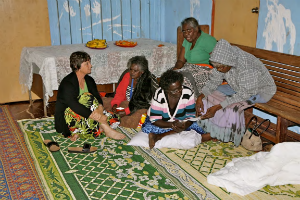You are here
“God is not outside our world...”
By Hannah Harper
 One windy weekend in May, after many months of planning and anticipation, Yolŋu from several communities in North East Arnhem Land gathered in Yirrkala. Together, Yolŋu church leaders and CSIS-EA Scripture-in-Use workers had organised the workshop for 'Marŋgithirr Yuṯa Manikaywu mala ga God-Wäŋarrwu Dhäruk' - learning new songs and God's Word. Marrpaḻawuy Marika and Gapany were instrumental in the planning and running of the weekend, with support from Maratja Dhamarraṉdji (NRCC East Arnhem Support Worker) and Margaret Miller (CSIS-EA Scripture-in-Use Facilitator). Mary Beth and Todd Saurman (AuSIL) were also available to share experiences from their music work with Indigenous people groups around the world. Over the weekend, 25 youth and adults participated in workshop sessions, and many more shared in worship services.
One windy weekend in May, after many months of planning and anticipation, Yolŋu from several communities in North East Arnhem Land gathered in Yirrkala. Together, Yolŋu church leaders and CSIS-EA Scripture-in-Use workers had organised the workshop for 'Marŋgithirr Yuṯa Manikaywu mala ga God-Wäŋarrwu Dhäruk' - learning new songs and God's Word. Marrpaḻawuy Marika and Gapany were instrumental in the planning and running of the weekend, with support from Maratja Dhamarraṉdji (NRCC East Arnhem Support Worker) and Margaret Miller (CSIS-EA Scripture-in-Use Facilitator). Mary Beth and Todd Saurman (AuSIL) were also available to share experiences from their music work with Indigenous people groups around the world. Over the weekend, 25 youth and adults participated in workshop sessions, and many more shared in worship services.
In an interview, Gapany tells how the workshop addressed questions and needs in the Christian community. "The more we discussed together over the weekend, the more it became clear to us what this music workshop was providing for everyone."
Maratja continues, “This music workshop brought to us greater issues than just music in worship - we found ourselves exploring the idea that God is everywhere.”
One key Scripture was 1 Corinthians 14:7-19, in which Paul writes, “There are doubtless ma n y different languages in the world, and none is without meaning, but if I do not know the meaning of the language, I will be a foreigner to the speaker and the speaker a foreigner to me. So wi th yourselves, since you are eager for manifestations of the Spirit, strive to excel in building up the church.”
Workshop participants were able to read and discuss these Scriptures in Djambarrpuyŋu and Gumatj. Maratja reflects, “At the first Pentecost, the Holy Spirit came down and gave people the ability to worship the LORD as one. He gave many languages to do that, and we can worship him also through all the varieties of languages and musical styles of our clans and people groups.”
Many favourite songs were shared throughout the weekend, original music written by Yolŋu Christians, or translated from English hymns / choruses. There also emerged a real sense of unity, liberty and prayerfulness. People of all ages and backgrounds converged on the church to worship in song and dance, also using keyboard, guitar, yiḏaki (didgeridoo) and biḻma (clapsticks). Maratja explains, “It is good to learn other styles of music and to use these for our worship too; they help us also to express worship and we can use these in our own way to express our faith. However, there is in our hearts the way we have been created from the beginning of time that is unique. We need God the Father and Holy Spirit to help us find those tunes that express ourselves from our hearts, the way that the Creator has made us. God is not outside our world, or even on the periphery. God needs to be in the centre of our whole world and life.”
“Can we find those styles of music that can be for worship and yet express our aboriginality? We need to examine these things, so it can become a lifestyle for us. A way of worship and praise to our Heavenly Father, a way of expressing our joy, sorrow, and heart issues directly to him from here in this place.” Maratja Dhamarraṉdji
In a previous issue of CoordN8, Gapany wrote, “I have been looking at the power and importance of music in carrying the message. Also how music brings people together in unity, how music touches people’s feelings. I have noticed how people don’t always read from the page, but sing from the heart.” As a member of the CSIS-EA Scripture-in-Use team, Gapany is keen to develop this service with Yolŋu congregations and communities. “We do not want to just start these discussions and forget them. These music workshops need to be ongoing."


